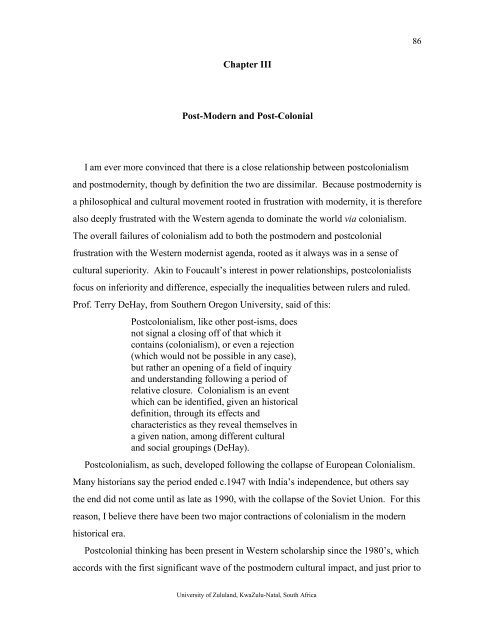Haase_UZ_x007E_DTh (2).pdf - South African Theological Seminary
Haase_UZ_x007E_DTh (2).pdf - South African Theological Seminary
Haase_UZ_x007E_DTh (2).pdf - South African Theological Seminary
Create successful ePaper yourself
Turn your PDF publications into a flip-book with our unique Google optimized e-Paper software.
86<br />
Chapter III<br />
Post-Modern and Post-Colonial<br />
I am ever more convinced that there is a close relationship between postcolonialism<br />
and postmodernity, though by definition the two are dissimilar. Because postmodernity is<br />
a philosophical and cultural movement rooted in frustration with modernity, it is therefore<br />
also deeply frustrated with the Western agenda to dominate the world via colonialism.<br />
The overall failures of colonialism add to both the postmodern and postcolonial<br />
frustration with the Western modernist agenda, rooted as it always was in a sense of<br />
cultural superiority. Akin to Foucault’s interest in power relationships, postcolonialists<br />
focus on inferiority and difference, especially the inequalities between rulers and ruled.<br />
Prof. Terry DeHay, from <strong>South</strong>ern Oregon University, said of this:<br />
Postcolonialism, like other post-isms, does<br />
not signal a closing off of that which it<br />
contains (colonialism), or even a rejection<br />
(which would not be possible in any case),<br />
but rather an opening of a field of inquiry<br />
and understanding following a period of<br />
relative closure. Colonialism is an event<br />
which can be identified, given an historical<br />
definition, through its effects and<br />
characteristics as they reveal themselves in<br />
a given nation, among different cultural<br />
and social groupings (DeHay).<br />
Postcolonialism, as such, developed following the collapse of European Colonialism.<br />
Many historians say the period ended c.1947 with India’s independence, but others say<br />
the end did not come until as late as 1990, with the collapse of the Soviet Union. For this<br />
reason, I believe there have been two major contractions of colonialism in the modern<br />
historical era.<br />
Postcolonial thinking has been present in Western scholarship since the 1980’s, which<br />
accords with the first significant wave of the postmodern cultural impact, and just prior to<br />
University of Zululand, KwaZulu-Natal, <strong>South</strong> Africa

















